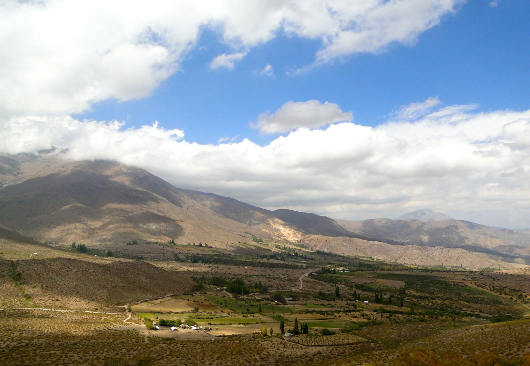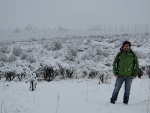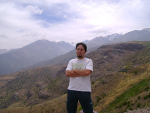Chile: Preserving Andes Country
24.03.14
Environmental conditions in the High Andes of Central Chile are extreme, affecting all aspects of life here and limiting species numbers. However the unique characteristics of this ‘bio-geographical island’ have resulted in a high level of endemism – plants are found here that occur nowhere else on Earth.

In recent years these areas have been negatively impacted by mining, one of Chile’s main economic activities. Large-scale projects, poor regulation and lack of effective monitoring, have resulted in an overwhelming number of abandoned mines and waste deposits, affecting water quality and availability. The Andina mine, a subsidiary of Codelco, one of the world’s largest copper extraction companies, is threatening glaciers in the region, and Barrick Gold had already caused irreparable damage to the glaciers of the Atacama region when it was eventually closed by court order in response to public pressure.
In our own region, in order to highlight the concept of sustainable development, especially in rural areas, we began a project to lay the groundwork for an alternative to the economic status quo. Through our project, called Andes Country, we worked with local people to encourage the buying of local products and services, initially focusing on tourism, and in 2008 we were recognized by the President of Chile, receiving the National Entrepreneur Award.This project is located in a rural part of the San Esteban municipality, in the Valparaíso region, where the country way of life is beginning to disappear as a result of migration to the city, and an ageing population. The reduction of the rural workforce and demographic changes are leading to a loss of cultural traditions and identity. The constant threat from new mining projects and lack of robust legislation is putting our natural heritage at risk, and we believe small communities should have a voice. If the ecosystems with which we coexist are degraded, we will become a less resilient community with lowering incomes and shrinking recruitment capacity, making us less able to compete in the world. We want to work with the community towards a more sustainable future and contribute to the national debate.
Our reports on the activities of two of Chile’s largest companies– the mining company, Andina, and entertainment company, Enjoy Casino Rinconada, have had some success. In the case of the mining company, our team used provincial broadcast media to draw attention to the polluting of the Blanco River, a tributary of the Aconcagua, the main river in this region, which begins in the High Andes and flows into the Pacific Ocean. Our actions led to community participation in the governance of Los Andos, and in the establishment of a legal framework, focusing on company responsibilities.In the case of the casino, a number of legal actions were taken over the discharge of contaminated water into small springs – a direct infringement of these environmental regulations.
These are the achievements so far, of our small team of professionals and volunteers, working to restore the lost balance between our natural environment and human activity and development. We are constantly making efforts to raise awareness of environmental issues in the media, and we hope this will result in the creation of a not-for-profit association that will give the community more power in the regulation of economic activities..This journey has shown us that there are a number of ways to achieve a harmonious coexistence between the needs of a modern society and the preservation of our natural environment. True sustainability can be accomplished through education, generating a real understanding of our natural and cultural heritage, and a change in economic and environmental policy in our country.
Franco Contreras / Jorge Zamorano
The Team:
 Franco Contreras,
Franco Contreras,
Indusrial Engineer
 Jorge Zamorano
Jorge Zamorano
Ecologist and Evolutionary Biologist
 Stephanie Donoso
Stephanie Donoso
Lawyer
For more information in Spanish, go to: www.andescountry.blogspot.com (English to follow later).